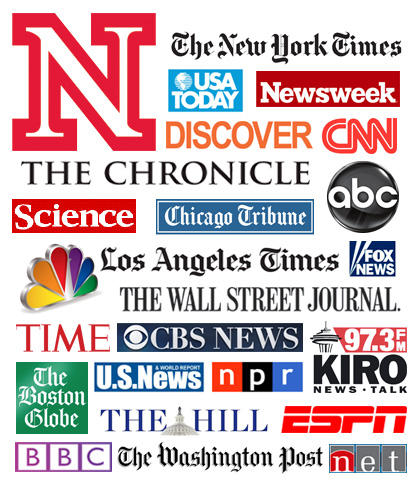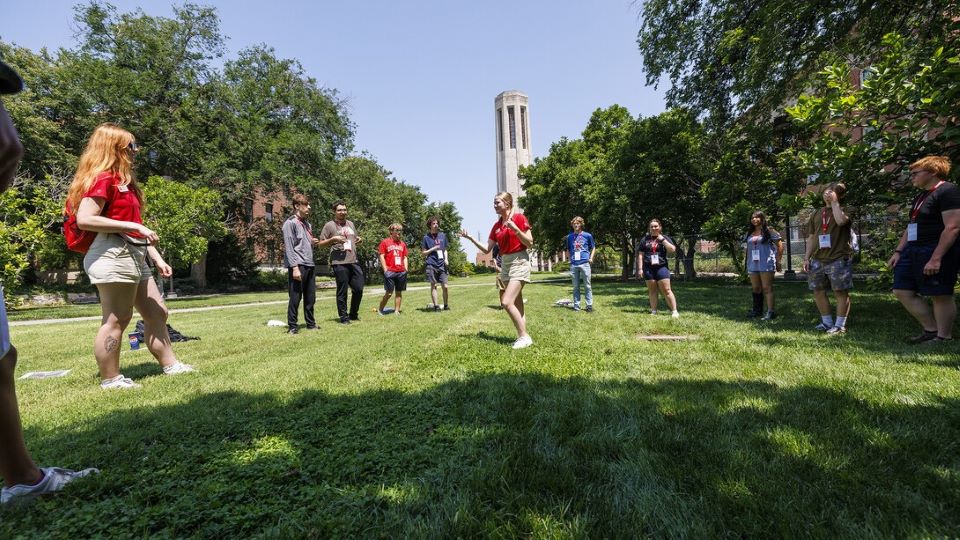
New research on using specially designed drones to start and manage conservation fires generated coverage for Sebastian Elbaum and Carrick Detweiler, computer science and engineering. Stories about their work appeared on Popular Science Aug. 2, Weather.com on Aug. 5 and NPR's Morning Edition on Aug. 3.
Matthew Jockers, English, and his upcoming book, "The Bestseller Code," were featured in the Wall Street Journal's fall books preview on Aug. 31. Jockers co-authored the book with his former student, Jodie Archer, a former acquisitions editor for Penguin UK. The book, to be released Sept. 20 by St. Martin's Press, details their research using computers to identify common patterns among novels that make the New York Times bestseller list.
In an Aug. 5 Science report, Kenneth Bloom, physics, said additional experimentation at the Large Hadron Collider at CERN in Switzerland ruled out what had been thought to have been the discovery of a new particle eight months ago.
Kelsy Burke, sociology, was featured in an Aug. 25 Christian Post article that highlighted her recent book "Christians Under Covers," an ethnographic study of Christian sex advice websites.
Aaron Duncan, communication studies, authored an op-ed about the TV viewing habits of Donald Trump supporters that appeared in the New Republic Aug. 4. The piece originated on The Conversation and also appeared on Business Insider and U.S. News & World Report, among other outlets. Duncan also appeared on Midpoint, a news program on WMNF radio in Tampa, Florida, to discuss his conclusions.
Max Perry Mueller, classics and religion, traced the history of Mormonism in an Aug. 4 Slate article to explain why Mormon public officials have such distaste for Donald Trump's rhetoric and his candidacy for president.
Agri-View reported Aug. 19 on a study by Rebecca Roston and Allison Barnes, biochemistry, that investigated how plants buffer against cellular breakdown in freezing temperatures.
James Takacs, chemistry, was quoted in an Aug. 31 News-Medical.net report on a $11.3 million grant from the National Institutes of Health to establish the Center for Integrated Bimolecular Communication. The new center will investigate cellular level miscommunications that contribute to complex diseases like cancer and diabetes.
William G. Thomas III, history, published an Aug. 19 op-ed in the Washington Post discussing what his research reveals about the Jesuit founders of Georgetown University and their role in perpetuating slavery. Thomas has spent a number of years researching slave petitions for freedom filed in the District of Columbia courts, including unsuccessful petitions filed by slaves owned by the Georgetown founders. Some experts say Georgetown likely would not still be in existence if it weren't for the sale of slaves form Jesuit plantations in 1838.
Cynthia Willis-Esqueda, psychology, and Stephane Shepherd, a postdoctoral Fulbright scholar from Australia, were featured in an Aug. 19 Indian Country Today Media Network article about their research investigating whether native youth are unfairly treated by risk assessment instruments commonly used by the criminal justice and mental health systems.


